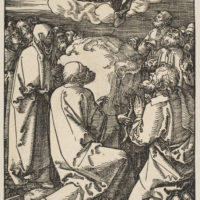As my husband Fred and I were planning our recent trip to Germany, Fred insisted on going to a few places: Cologne and Trier HAD to be on our itinerary. But he also wanted to go to Bingen on the banks of the Rhine River. He wanted to pay homage to the fascinating 12th century saint Hildegard of Bingen. And since I am fascinated by Hildegard, who was I to object?
Now I mentioned St. Hildegard before. She lived in the 12th century and was given into the care of a religious recluse at the tender age of 8. Her entire life, she had divine visions; she was a healer who knew the properties of many herbs, fruits, and barks. She was an accomplished composer. She authored several books. She conversed with the mighty ones of her day, among them the Pope and Emperor Frederic Barbarossa. But in all of that, she was first and foremost a faithful servant of God and her neighbor, never forgetting about the spiritual – and physical – needs of the people in her community.
Hildegard also founded two abbeys: the first one in Bingen – hence her name, Hildegard of Binge. Now unfortunately, there are no traces left of this abbey – there is a commercial area today where her abbey once stood. However, Hildegard founded a second abbey, just across from Bingen on the other side of the Rhine, above the hills of a small and romantic town called Rüdesheim. This abbey also fell into ruins, but was lovingly rebuilt in the Romanesque style at the beginning of the 20th century and dedicated to St. Hildegard.
A group of about 40 Benedictine nuns still live there today. Those nuns follow the ancient rule of ‘ora et labora’, pray and work. And, yes, those nuns work. In fact, they are pretty entrepreneurial – they run a retreat center, a café, and a gift shop, where they, among many other things, sell wine they produce in their very own vineyards. And I have to say, they produce a very fine Riesling. And those nuns follow in the spiritual footsteps of Hildegard, singing her music and continuing to study the healing properties of food, herbs, barks, and seeds. They also dedicate their lives in service to others.
So since we knew we wouldn’t find anything of interest in Bingen, Fred and I decided to go to Rüdesheim instead. We first visited St. Hildegard Abbey at sunset. We were surprised to find the abbey church open and walked in. First, there was silence, but then, some angelic voices started singing. And as we walked around the church, we saw the singers – a group of nuns.
Unbeknownst to us, we had walked right into a Compline service. And so we stayed for a while, listening to those nuns. They were lifting their voices in unison (which is typical for the style of the music Hildegard composed), but those moments of communal singing would be interrupted by brief solo chants. And every nun got her turn. One voice would sound young and strong, another one older and feeble, another one timid and a little bit off key. And I was strangely touched by the fact that every nun, regardless of the quality of her solo voice, got her turn. This wasn’t a performance. This was worship. Or, to be more precise, it was worship SERVICE. It wasn’t about perfection. It was about being a part of the community, where every single voice is lifted up to God, where every single voice is heard. Where no one has to be the best, the brightest, the most beautiful, not even the most pious one, but is enough in offering their gifts, and even more than that: precious in God’s eyes.
It was powerful to me to be reminded of that as I was listening to the nuns singing. Because we live in a day and age when everything is so darn competitive. How do I get into a decent school, that top college, what do I have to do to get that great job, to get that promotion? How do I make it to the top? And we admire – and at times even idolize – those who are at the top of their game, whatever this game may be – and often, we are a little bit envious, too. And if we want to be at the top of our game, we need not only be good at something, we also need to know how to sell ourselves, and present ourselves, our talents and accomplishments in the best possible light. We need to be confident and sometimes even ruthless. Sometimes, promoting ourselves comes at the expense of someone else. After all, that’s what competition is all about.
Now of course this is not just a modern or post-modern phenomenon. Human beings have always been competitive. Nature for that matter is highly competitive – think about Darwin’s observation that, in the natural world, it’s all about the survival of the fittest.
There seems to be that innate drive in human beings to be among the fittest, to be better at something than others, to be at the top – because it’s tough to be at the bottom, to be among the least and the last. Who would voluntarily be at the
bottom?
Even Jesus’ disciples – those, who have been following Jesus for months, witnessing his self-sacrificial love and service to the least, are not immune against the want to be great. In today’s gospel, Jesus, once again, tells his disciples about what’s ahead: his suffering and death, his humiliation. And the disciples just don’t get it. ‘They did not understand what he was saying and were afraid to ask him,’ we read in today’s gospel. It’s too weird, too confusing, too unnatural even. Why would Jesus, whom Peter just identified and proclaimed as the Messiah, go to such depths? Why would he humiliate himself like that? Why would he go so low?
And as they are on their way to Capernaum – their home base in Galilee, for one last time before the journey to Jerusalem and to the cross – the disciples start arguing among themselves. Not about what Jesus’ words about suffering and death could mean, not about how they could maybe carry on his legacy in serive, no: they argue about who among them is the greatest. Could it be that the disciples are already trying to argue among themselves who might be the new leader after Jesus is dead and gone – who is the best, the brightest, the worthiest?
Now apparently the disciples have spent enough time around Jesus to somehow know that an argument about who is the greatest might be inappropriate. They seem ashamed as Jesus asks them about their argument, and remain silent. Almost like children who’ve just been caught in the act of doing something they’re not supposed to do.
Now Jesus doesn’t scold them, but rather teaches them a lesson. ‘Whoever wants to be first must be last of all and servant of all,’ he says to those in his inner circle.
Now if that isn’t counter-cultural, or even unnatural, I don’t know what is. Instead of striving for the top, as followers of Christ we are to strive for the bottom – and love and serve those we find there. Of course Jesus has been doing this all along, and it is quite interesting that the disciples haven’t really picked up on that after all those months following him. And maybe their lack of understanding what Jesus is all about – what the kingdom Jesus preaches in word and deed is all about – also keeps them from understanding why Jesus has to go to the depths of humiliation, suffering and death.
Jesus is trying to teach his followers, Jesus is trying to teach us, that in the kingdom of God, it is not about the greatness of a few – it is about community with God and with one another, it is about the wellbeing of the community, the commonwealth, if you will. And the community can only do well and be great if its members are willing to serve one another rather than trying to seek their own advantage at the expense of others. And that’s a very tough lesson – two millennia later, we who profess to be followers of Christ still have trouble with that radical loving and serving our neighbor thing. Just look how unwilling so many are to bring even small sacrifices for the good of the community today.
However, we have there always have been those who took these words of Christ to heart – and found true greatness in service. Hildegard of Bingen, whom I mentioned at the beginning of this sermon, is one of them. She served – but didn’t put her light under a bushel. No, she shared her manifold gifts, and her voice freely. She found joy in serving God and the least of these, together with the nuns and laypeople she led and inspired as an abbess. Maybe that’s what makes her a true saint.
But we have received the very same call – to love and serve God and neighbor. Christ calls us to go low, to the bottom, and love and serve those we find there. Because this is where we find God. In the depths of human existence. In service. In community with God and neighbor. Amen
This post is also available in: German






